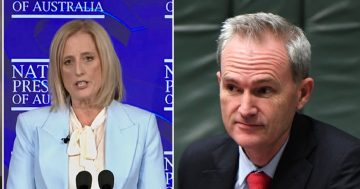 1. This week 10 years ago, Attorney-General, Robert McClelland opened the new Australian Government Crisis Coordination Centre, saying the purpose-built secure facility would monitor risks to Australia 24 hours a day, seven days a week. He said the $14 million facility in Canberra had capacity for up to 100 officers from Commonwealth, State and Territory Agencies onsite to manage national responses to large-scale natural disasters or acts of terrorism.
1. This week 10 years ago, Attorney-General, Robert McClelland opened the new Australian Government Crisis Coordination Centre, saying the purpose-built secure facility would monitor risks to Australia 24 hours a day, seven days a week. He said the $14 million facility in Canberra had capacity for up to 100 officers from Commonwealth, State and Territory Agencies onsite to manage national responses to large-scale natural disasters or acts of terrorism.
“It includes a large operational room, linked video conferencing facilities with the States and Territories, crisis coordination rooms as well as secure premises that can be used during a national security incident,” Mr McClelland said.
2. The Australian Institute of Health and Welfare (AIHW) won the Information Management category of the international FutureGov 2011 Awards for its METeOR Metadata Online Registry, which was recognised for its “excellence in the efficient capture, storage and distribution of citizen information”. Director and CEO of the AIHW, David Kalisch said METeOR was a web-based system for managing, developing and storing data definitions and standards (metadata), which was being actively used by more than 35 Agencies.
“We are very proud to have won this award because METeOR has brought real efficiencies to our business by revolutionising the way users develop, collaboratively review, submit, process and disseminate new data standards,” Mr Kalisch said.
3. Also this week a decade ago, Sydney was voted the world’s number one city in the Conde Nast Traveller Reader’s Choice Award, beating the likes of international favourites such as New York, Paris and Cape Town. NSW Minister for Tourism and Major Events, George Souris said it was the second major international award for Sydney in a week after it was named the world’s best festival and major events city by the International Festival and Events Association a few days earlier.
“Winning this latest award demonstrates Sydney’s position as a world-leading destination and the gateway to Australia,” Mr Souris said. “It’s a vote of confidence not by travel writers or agents, but by ordinary travellers.”
4. All State and Territory Governments signed up to the first truly national regulatory system for early childhood education and care services, a move hailed as a significant milestone in boosting quality and transparency in Australian childcare centres. Federal Minister for Child Care, Kate Ellis said the evidence was clear that the quality of experiences children had in their first five years of life had a profound influence on their future wellbeing.
Ms Ellis said the new regulations would “mean that parents can now have confidence that no matter where they live and no matter what childcare centre their child is attending — they will be receiving an appropriate standard of care.”
5. Minister for Employment, Training and Further Education, Jack Snelling announced approval had been granted for a fourth university for South Australia, saying Laureate Education Asia would establish the private university in Adelaide with the proposed name of Torrens University Australia. He said it would be the first private national university established in Australia since the 1980s.
“To attract a university of this calibre shows the rest of the world is looking to South Australia as an educational hub,” Mr Snelling said. “This really is a huge investment from Laureate and its decision to base its Australian University in South Australia cements our reputation as an education capital.”
6. Queensland Minister for Environment, Vicky Darling announced six members of the Queensland Parks and Wildlife Service’s Shoreline Cleanup Assessment Team (SCAT) were on their way to New Zealand to help with clean-up and recovery efforts following a damaging oil spill from a cargo vessel that ran aground in the Bay of Plenty.
“SCAT team members have been trained to nationally recognised standards and their skills in foreshore assessments, incident management and oiled wildlife response will be invaluable in the affected areas,” Ms Darling said. She said information provided by the SCAT crews would play a key role in planning and prioritising clean-up efforts.








